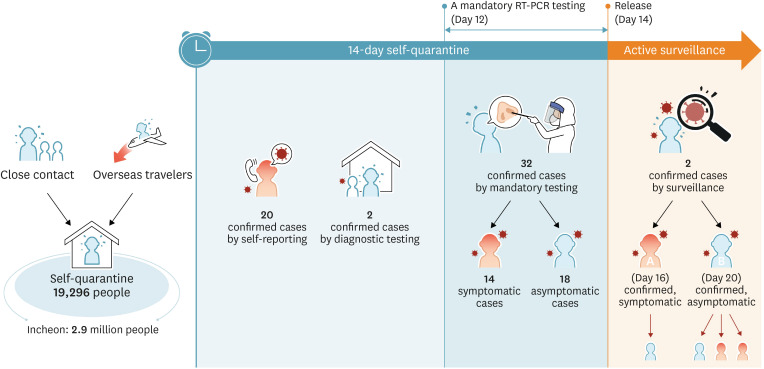J Korean Med Sci.
2020 Aug;35(34):e314. 10.3346/jkms.2020.35.e314.
The Importance of Mandatory COVID-19 Diagnostic Testing Prior to Release from Quarantine
- Affiliations
-
- 1Department of Preventive Medicine, Gachon University College of Medicine, Incheon, Korea
- 2Artificial Intelligence and Big-Data Convergence Center, Gil Medical Center, Gachon University College of Medicine, Incheon, Korea
- 3ncheon Metropolitan City, Incheon, Korea
- 4Korea Centers for Disease Control and Prevention, Cheongju, Korea
- 5Incheon Communicable Diseases Center, Incheon, Korea
- KMID: 2505727
- DOI: http://doi.org/10.3346/jkms.2020.35.e314
Abstract
- A 14-day quarantine is implemented in many countries in response to the coronavirus disease pandemic. Korea implemented a mandatory quarantine for those who had close contact with infected patients and those returning from abroad. The present study explored the implications of mandatory coronavirus disease 2019 testing before releasing individuals from the 14-day quarantine in Incheon, Korea. From February 11 to July 5, 2020, 19,296 people were self-quarantined, and 56 (0.3%) of them were confirmed cases of COVID-19. Twenty (35.7%) were identified through the reporting of symptoms during quarantine, and 32 (57.1%) were identified using mandatory pre-release RT-PCR tests. Among the 32, 14 (25%) individuals reported mild symptoms and 18 (32.1%) were asymptomatic. It is suggested that mandatory diagnostic testing prior to release and the symptom-based surveillance after the 14-day quarantine may help control delayed or asymptomatic COVID-19 cases.
Keyword
Figure
Cited by 1 articles
-
Preparing for the Coronavirus Disease (COVID-19) Vaccination: Evidence, Plans, and Implications
Jaehun Jung
J Korean Med Sci. 2021;36(7):e59. doi: 10.3346/jkms.2021.36.e59.
Reference
-
1. Jung J, Noh JY, Cheong HJ, Kim WJ, Song JY. Coronavirus disease 2019 outbreak at nightclubs and distribution centers after easing social distancing: vulnerable points of infection. J Korean Med Sci. 2020; 35(27):e247. PMID: 32657088.
Article2. Centers for Disease Control and Prevention. Returning from International Travel. 2020. Updated 2020. Accessed June 14, 2020. https://www.cdc.gov/coronavirus/2019-ncov/travelers/after-travel-precautions.html.3. Korea Centers for Disease Control and Prevention. COVID-19 Response Guidelines (Edition 8-1). 2020. Updated 2020. Accessed June 7, 2020. http://ncov.mohw.go.kr/shBoardView.do?brdId=2&brdGubun=28&ncvContSeq=2447.4. Lauer SA, Grantz KH, Bi Q, Jones FK, Zheng Q, Meredith HR, et al. The incubation period of coronavirus disease 2019 (COVID-19) from publicly reported confirmed cases: estimation and application. Ann Intern Med. 2020; 172(9):577–582. PMID: 32150748.
Article5. Bai Y, Yao L, Wei T, Tian F, Jin DY, Chen L, et al. Presumed asymptomatic carrier transmission of COVID-19. JAMA. 2020; 323(14):1406–1407.
Article
- Full Text Links
- Actions
-
Cited
- CITED
-
- Close
- Share
- Similar articles
-
- Management of future infectious diseases: eight recommendations for national quarantine
- Coronavirus Disease-19: Quarantine Framework for Travelers Entering Korea
- Laboratory Diagnosis of COVID-19 in Korea
- Mothers’ experience of caring for home-quarantined children after close contact with COVID-19 in Korea: an exploratory qualitative study
- The Mediating Effects of Health Concern and Depression in the Relation between Self-quarantined People’s COVID-19 Stress and Fatigue


